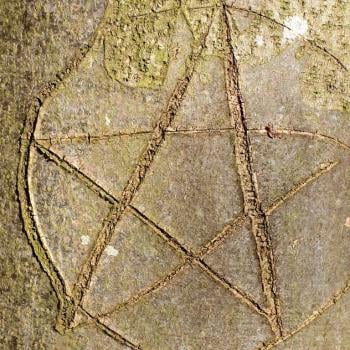Editors' Note: This article is part of the Patheos Public Square on the Spirituality of Sex. Read other perspectives here.
In our time there is a rising acceptance of one's right to self-define, or (to put it more religiously), to self-realize. Expressed provocatively, this becomes: "I am whatever I say I am and you must accept my assertion and behave accordingly." In his legal opinion on Planned Parenthood v. Casey, Chief Justice Kennedy described this self-definition more elegantly as "the right to define one's own concept of existence, of meaning, of the universe, and of the mystery of human life." Of course, during most of the history of Western culture such an expression of human autonomy was rare. In the main, people believed that one's rights to life, liberty, and the pursuit of happiness were endowed, from outside of oneself, by the Creator. This is where the historic Christian view of sexuality finds its source.
The Bible discloses that there only two options for human existence. According to Paul in Romans 1:25 you either:
- "worship creation" (in a thousand different religious or non-religious ways), an option we can call Oneism, because divinized nature, in the name of human autonomy, self-creates, beyond which there is nothing; thus all reality shares the same self-creating reality—all is "one." In this world, humans self-define.
- "worship the Creator" who made us, body, mind, and spirit, which option we can call Twoism, since there are two fundamentally different kinds of existence—the transcendent Creator, on the one hand, and everything else which is created, on the other. In this world, humans accept that the world has already been defined.
Needless to say, these two options are mutually exclusive. Oneism is based on impersonal sameness, which disallows distinctions, thereby denying holiness (a biblical notion according to which everything has its rightful and distinct place). In Twoism, on the other hand, holiness (things in their rightful places) is normative, and God, distinct from creation, in his rightful, separate place, is the only one who may be worshiped without committing idolatry. According to scripture, Twoism, as God's revelation of himself, is thus the key to the cosmos.
Belief about reality that starts with the Creator has numerous implications. If God creates, he creates everything. He must be the source of everything in our human reality, including relationships, personhood, intelligence, and even love. John 1:1 reveals that the Logos, the Word or intelligence, who "was God," was also "with God." Thus mysteriously there is a diversity of persons in the unity of God, not a single Being, but three (including the Spirit). Thus God can be both personal and transcendent. In his deep being, God is love, even before he loved us, because, being Trinity, interpersonal, intelligent relationship existed before anything created came on the scene. God was already enjoying an intimate personal relationship of love among the persons of the Trinity long before he created the universe. Indeed, creation is an act of love, as God without constraint grants creatures to share in the blessing of his personal existence. It follows that we do not self-define. God, who precedes us, determines everything that we are in the human realm.
Therefore, to describe or define the human race, we must begin with the Trinitarian persons of God. Calvin in his Institutes says that to understand man, we must begin with God. Jesus said that the first commandment is "You shall love the Lord your God," and that "the second [is]: You shall love your neighbor as yourself" (Matthew 22:37–39). We honor this commandment by seeking to recognize who God is. In creation God reveals himself by putting his imprint on what he brings into being. In condescension, the God of the Bible grants the amazing gift of dignity to humans. The eternal Creator of the universe identifies so closely with the human creation that he makes us "in our [God's] image and our [God's] likeness." Traditionally, human beings have often been called "image-bearers," carriers of God's image, not only as wise rulers of the world (Genesis 1:26), but also in male/female sexuality. The Genesis text affirms: "God created man in his own image: male and female he created them" (Genesis 1:27). Western culture used to see humans as defined by God in a plethora of ways: intelligence, wise dominion, and sexual distinctions. Today, however, our culture begins with the opposite starting point: love not for the Creator but for mankind and for self-designation. This combination engenders a very different spirituality, which, in turn, produces a very different Oneist view and practice of sexuality.
One of the essential things about God is that while he imprints his image of personhood on humanity, he is ontologically different from the creation. Difference thus serves as the model for the created order. In Genesis 1, the iconic first chapter of the Bible, God separates day from night and dry land from sea; makes animals different from one another; and creates the fundamental male/female distinction. In a particular way, the sexual distinction reflects who God is.




